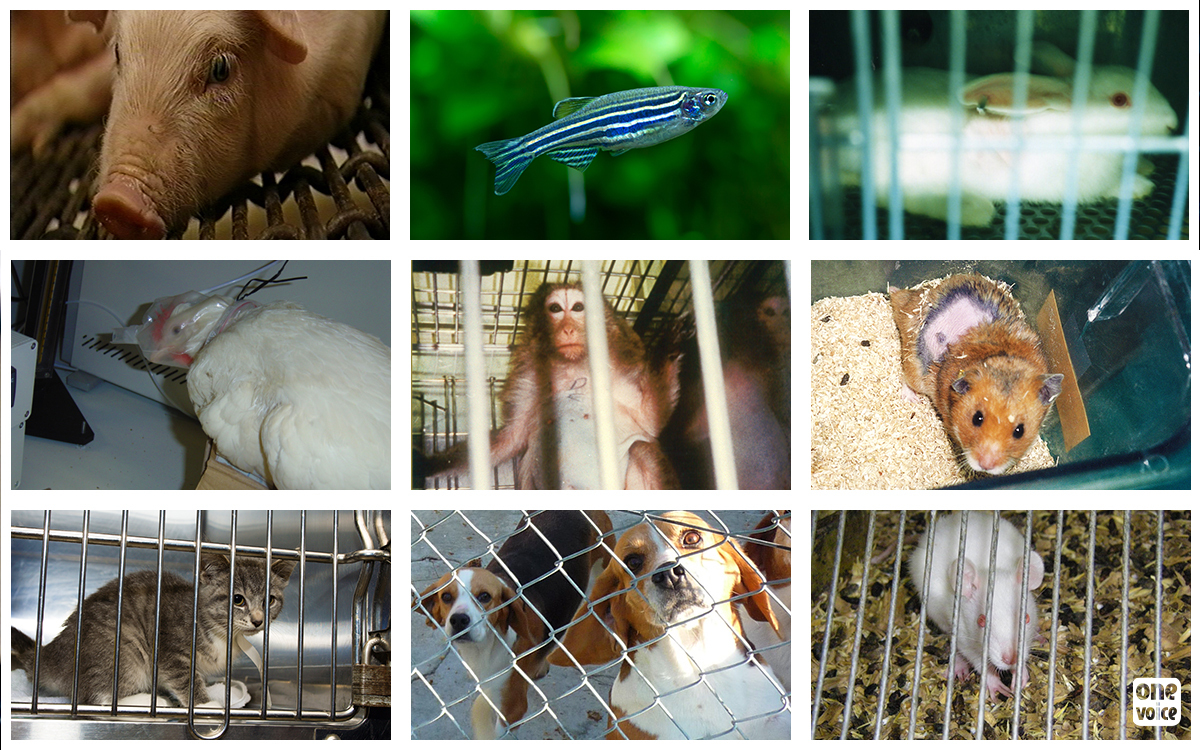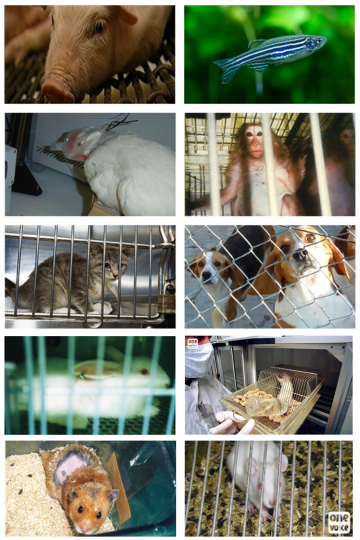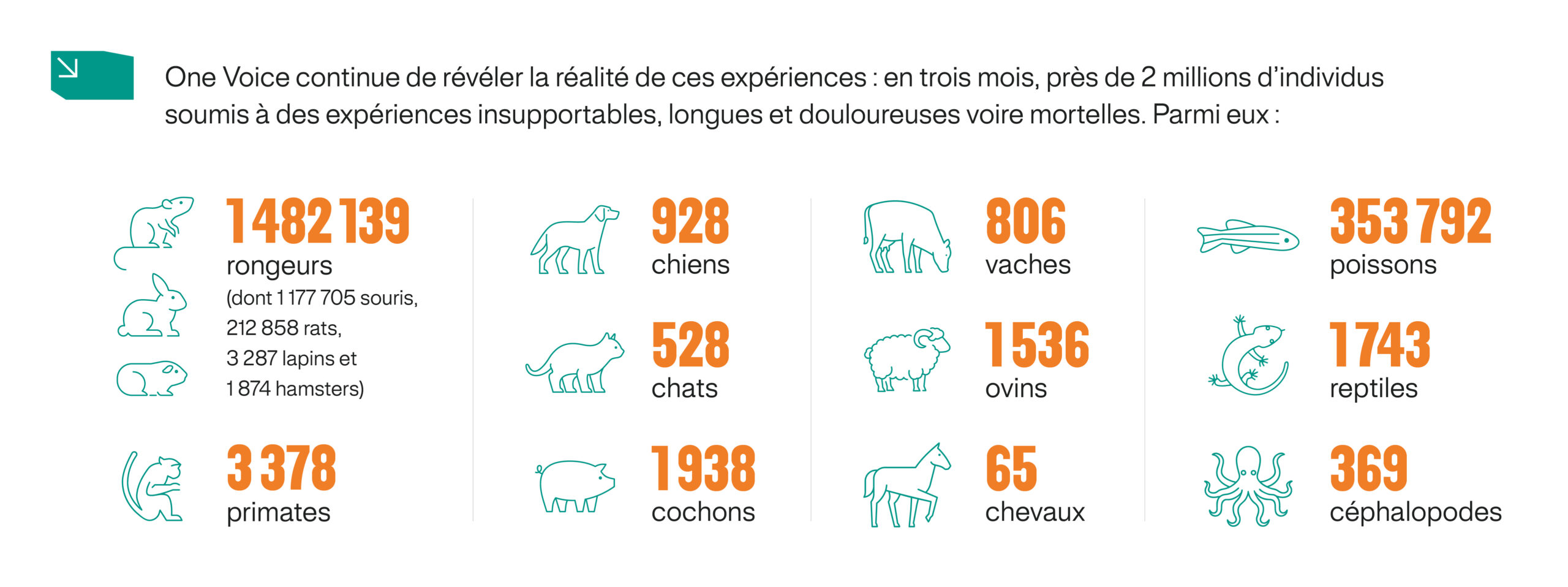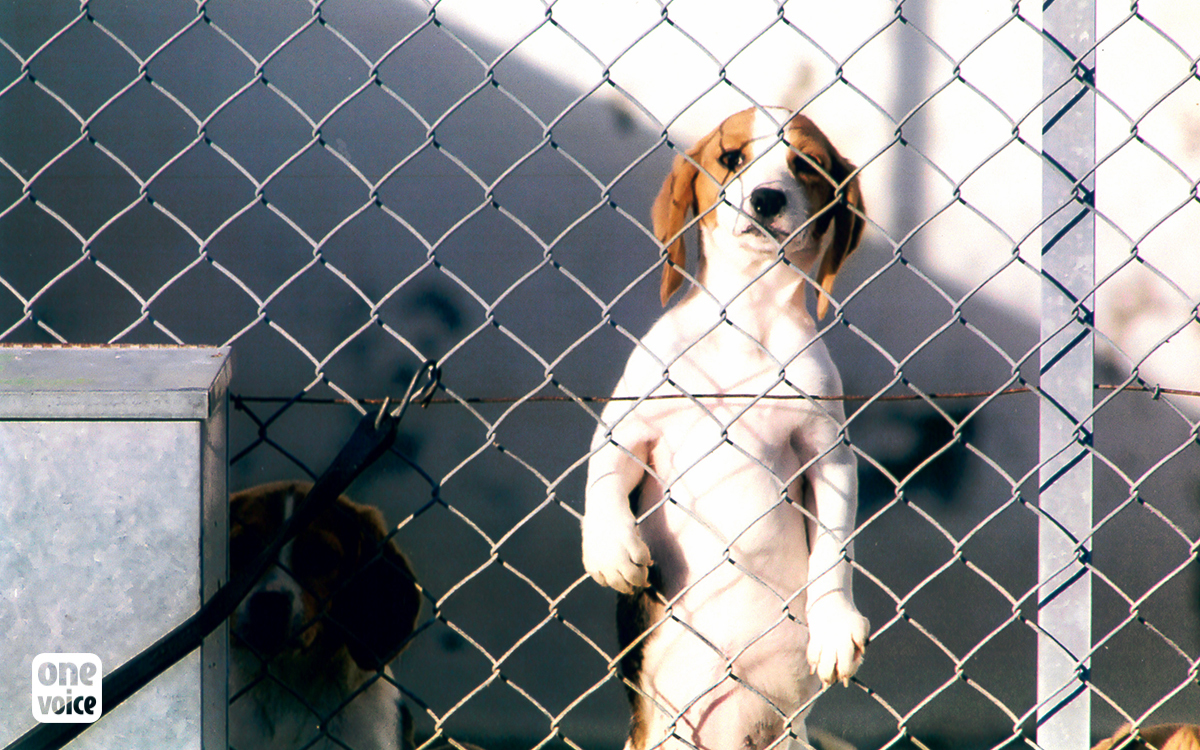

In the space of three months, the French government has authorised experimentation on more than 1.8 million animals in French laboratories
In France, authorisations for protocols involving animals continue, month after month, without any questioning. Fundamental and applied research, regulatory and toxicological testing: all continue to cause the suffering and death of hundreds of thousands of sentient beings. Between 22 July and 22 October 2025, 1,867,167 animals were used in experimental projects authorised by the Ministry of Research. Here are a few examples presented by One Voice!

Behind these figures, a wide variety of projects continue to be carried out throughout the country, illustrating the extent to which France is not making any real transition towards animal-free science, despite the knowledge and tools that would make it possible to reduce the use of animals.
Primates: lives destroyed in the name of science
In France, 3,378 primates — mainly macaques and marmosets — continue to be used in experiments of unacceptable cruelty. These social, intelligent animals are torn from their fellow creatures and condemned to months of suffering in laboratory cages. Here is a non-exhaustive list of the abuses they suffer:
- As part of toxicology studies, 2,500 macaques will receive test substances daily, either orally or by injection. They will undergo blood and tissue sampling, and sometimes surgical implants. Some will be isolated for up to three months, restrained in a chair during procedures. The expected effects include pain, stress, weight loss and physiological changes. The vast majority of them will be killed, and a few will be reused in other experiments.
- In another protocol, 32 macaques will undergo injections directly into the eyes, repeated examinations under anaesthesia, and painful specimen samplings. Fasting and stressed by restraint, they will experience acute pain before also being killed for analysis of their eyes. Again, 28 of them will not survive. The remaining four will be used in another project.
- In order to study yellow fever virus, 66 macaques will be deliberately infected by mosquitoes carrying the virus. They will endure fever, vomiting, loss of appetite and extreme fatigue before dying from the infection or being killed for “study”.
- Finally, 320 marmosets and 225 macaques will undergo surgical implants with devices to administer test molecules and monitor their physiological parameters. The consequences: pain, inflammation, isolation and intense stress.
While these experiments are on the increase, the State plans to expand the Rousset Primatology Station in the Bouches-du-Rhône region to turn it into a “National Primatology Centre“. This public project, estimated to cost €30 million and financed by our taxes, will prolong the captivity and suffering of thousands of animals.
We strongly condemn this project. Rather than investing in suffering, France ought to invest in the science of the future: animal-free, ethical and truly innovative.
Dogs and cats: our companions are being exploited in laboratories in France
In France, thousands of dogs and cats continue, year after year, to be subjected to long, painful and often fatal experiments. Behind each protocol lies an unbearable reality: affectionate animals are being turned into research tools. Here are a few examples:
- To test medical devices, 240 dogs will undergo one or more surgeries lasting up to three hours. Implantations, reopenings, repeated blood samples: despite anaesthesia, post-operative pain, infections and locomotor discomfort are common. All will be euthanized at the end of the studies.
- In another project, 90 dogs will receive experimental molecules by injection, sometimes directly into the brain or joints. These procedures cause stress and pain, and nerve damage may occur. Again, the majority will not survive.
- 260 cats will be used in infection studies involving the administration of viruses or bacteria. Injected, swabbed daily, and subjected to repeated sample-taking, they will develop fever, cough, mouth ulcers, conjunctivitis, diarrhoea, or vomiting. 220 will be killed, and the rest will be used in another project.
- 80 dogs will be vaccinated and then exposed to pathogens administered oro-nasally. Frequent blood samples, daily rectal swabs, repeated restraint and stress are part of the protocol. Unvaccinated animals, used as controls, will develop diarrhoea, vomiting and fever before being euthanized.
- Finally, 50 dogs will undergo major surgery to implant vascular devices. Despite anaesthesia, post-operative pain, fatigue and loss of appetite are inevitable. All will be killed at the end of the experiments.
These are the atrocities that continue to occur every day in French laboratories.
Rodents: still as many are subjected to painful and deadly projects
With more than 1.4 million individuals exploited, rodents remain the most commonly used animals in French laboratories. Mice, rats, rabbits and hamsters account for the majority of protocols, often among the most invasive.
Here are a few examples:
- In a project on amyotrophic lateral sclerosis, 6,170 mice will be subjected to repeated injections, some directly into the central nervous system, to study the progression of the disease. They will develop progressive paralysis before being euthanized.
- To study optic nerve damage, 3,075 mice will receive up to three injections in the eye, followed by a section of the nerve, causing inflammation, pain and loss of vision.
- In a neurobiology project, 180 mice will undergo surgery, lens implants and behavioural tests. Deprived of food and isolated, they will receive electric shocks before being killed.
- To study bone marrow transplants, 8,564 mice will be irradiated, grafted and regularly sampled, causing stress, weight loss and repeated pain over several weeks, even though these procedures are classified as “moderate”.
- 7,624 mice will be victims of a project on Alzheimer’s disease, enduring force-feeding, anaesthesia and terminal surgery. Pregnant females will undergo premature births and develop motor and cognitive disorders before being killed.
- 45,000 mice will undergo blood sampling, anaesthesia, surgery and repeated injections, including subcutaneous implants and administrations. They will suffer pain, bruising, hypothermia, stress, weight loss and motor disorders, before most of them are killed.
- 4,692 mice will receive neurotoxins by injection or orally in a botulism protocol, leading to progressive paralysis, hypothermia and isolation, eventually resulting in certain death.
- 9,934 mice will be manipulated over several weeks to test treatments against tumour and metastatic cells after receiving tumour cell injections. They will suffer stress, pain, irradiation and restricted mobility, with some developing conditions leading to loss of appetite and weight. All of the mice will be killed.
- Finally, 7,680 mice will be subjected to severe peritonitis, artificially induced by surgery or injection of intestinal contents. They will experience a drop in body temperature, weight loss and depression before being sacrificed for observation.
Ethical and modern science is possible
The transition to animal-free science is no longer an utopian dream: it is overwhelmingly supported by the French population (Ipsos/One Voice survey, April 2023), by nearly 150 European scientists from 19 Member States, by the European Parliament in 2010 and 2023, and by French parliamentarians.
We therefore demand that laboratories fully comply with the law, giving priority to alternative methods whenever available.
We encourage professionals to train in animal-free research techniques and urge our political representatives to back significantly increased funding for these approaches.
Because 21st-century science can no longer rely on practices from a bygone era.
Together, let us call on the Minister for Higher Education and Research to commit to ethical and modern research.
